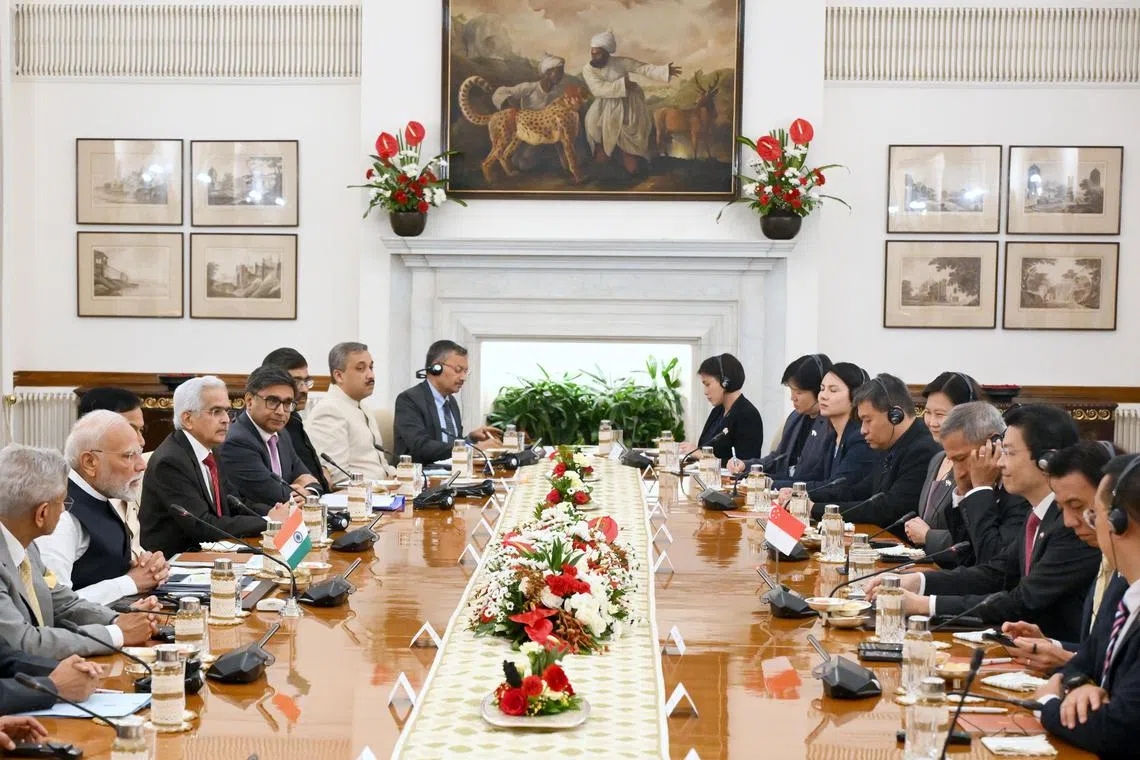S’pore-India ties can be strengthened, built on stronger understanding: PM Wong
Sign up now: Get ST's newsletters delivered to your inbox

Prime Minister Lawrence Wong with Indian Prime Minister Narendra Modi at a delegation meeting at Hyderabad House in New Delhi on Sept 4.
ST PHOTO: SHINTARO TAY
- PM Wong highlights Singapore's desire for a broader relationship with India, beyond trade and investment, based on shared values and mutual trust.
- Singapore and India announced an "ambitious" roadmap for their Comprehensive Strategic Partnership (CSP), focusing on technology, R&D, and new innovations.
- PM Wong sees India as a key growth engine in Asia alongside China, advocating for an open, inclusive regional framework with Asean at the centre.
AI generated
NEW DELHI – Singapore wants its relationship with India to range wider into more fields, even as ties stay anchored on shared values and mutual trust and respect, said Prime Minister Lawrence Wong.
It is important that the relationship between both countries goes beyond trade and investment, and is underpinned by people-to-people ties, he told Singapore media in a wrap-up interview at the end of a “short but productive” official visit to India from Sept 2 to 4.
Speaking to reporters hours after announcing an “ambitious” road map for the comprehensive strategic partnership (CSP) with India
“It is not just a name, we do it because it is a substantive relationship which we want to nurture and cultivate and grow together for mutual benefit,” he said.
PM Wong said building a stronger base of broad understanding of India remains a work in progress, and the Indian diaspora working and living in Singapore has been helpful in bringing the business communities closer together.
But a lot more can be done to cultivate these relationships, including through exchanges between the two civil services, but “it cannot just be Government alone”, he said.
If more Singaporeans study in Indian universities, travel to India or work in the sub-continent, then Singapore can collectively raise its understanding and appreciation of the country, he added.

Prime Minister Lawrence Wong meeting Indian National Security Adviser Ajit Doval in New Delhi on Sept 4. With them is Foreign Minister Vivian Balakrishnan.
ST PHOTO: SHINTARO TAY
PM Wong said the Government has been highlighting business opportunities in India, and will continue to do so.
“There are a lot of exciting possibilities that we are pursuing in terms of cooperation in new technology, R&D and new innovations, not just in existing areas of trade and investments,” he said. “More and more you do see India growing its technological competencies – it is a huge country with a lot of capabilities.”
Areas ripe for collaboration and mutual benefit include artificial intelligence, quantum computing, space, and new energy possibilities like ammonia and low-carbon hydrogen, he noted.
As part of the CSP road map, Singapore and India agreed to make progress in initiating a fresh review of the bilateral Comprehensive Economic Cooperation Agreement (Ceca). Asked for more details, PM Wong said the two leaders had discussed this briefly, and officials would be following up to work out the timeline for this review.
While Ceca provides a framework for free trade and investments, Singapore has put in place new mechanisms for cooperation, such as the India-Singapore Ministerial Roundtable and Business Roundtable, he noted.
Through these mechanisms, the two countries have been able to identify new opportunities, such as in semiconductors, logistics and the digital space, and on Sept 4, agreements were exchanged to deepen cooperation in these areas.
On a regional scale, it makes a lot of sense for Singapore to forge close links with India, said PM Wong.
China is an established growth engine in Asia, and India will emerge as the second growth engine, he said.
“Many years ago, we used to say China and India are the two wings that will enable the whole region to take off, and I think we are seeing that happen now,” he added.
What Singapore wants to see in Asia is an open and inclusive regional framework with Asean at the centre, working with all the major powers, he said.
Asean-India ties are hence important and mutually beneficial.
“From a strategic point of view, it provides that balance for stability, for resilience and for continued dynamism and prosperity for all of us in Asia,” he said.
Singapore has never wanted a world divided into rigid blocs, where countries end up having to choose sides, he said.
“We want a framework in this world where countries have the space to chart their own path and work together with different countries, big and small, for shared progress together.”



